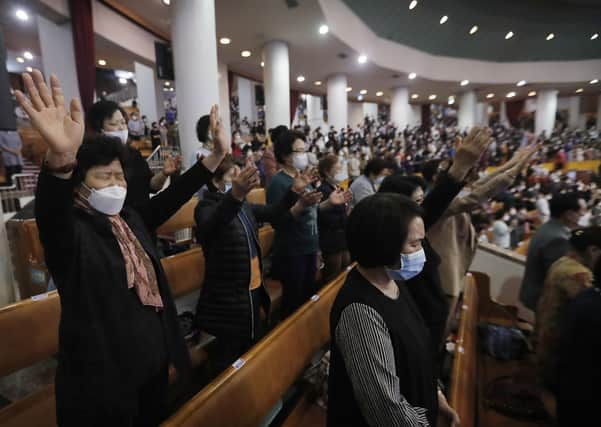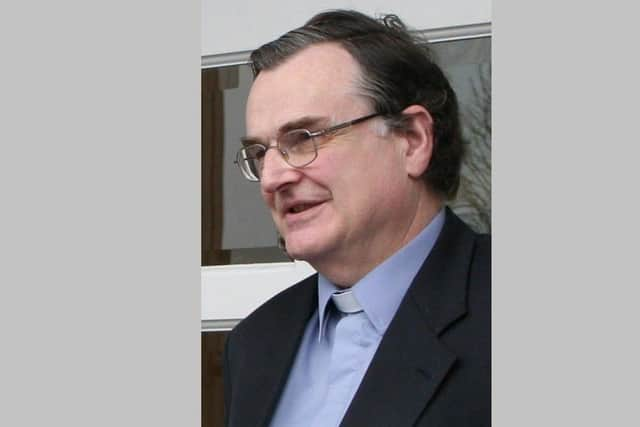Ian Ellis: Christianity has had a positive influence South Korea so it is a pity to see some churches linked to spread of Covid


If clergy have nightmares, then having one’s congregation identified as the source of a Covid outbreak is surely among the most disturbing.
Two Korean churches that have been particularly associated with outbreaks are the Sarang Jeil Church and the Shincheonji Church.
Advertisement
Hide AdAdvertisement
Hide AdBoth are large but also controversial churches and are very different from what might be described from a western perspective as mainstream.


The Guardian’s Tokyo correspondent Justin McCurry and South Korea journalist Nemo Kim, in a joint report, have described Sarang Jeil as “an ultra-conservative church” and Shincheonji Church as “a secretive Christian sect that some experts call a cult”.
Yet in Korea, apparently, they have clout.
Writing recently together in The Korea Times, Hanyang Journal society editor Jian Seo and Seoul-based Korean Studies academic David Tizzard observed: “Courts in Korea have been perceived to have bowed down to many of the churches here during the pandemic, often withdrawing rules or restrictions as a result of pressure being applied by religious groups and the cries of discrimination.”
The article went on to indicate that in South Korea churches are often run “as a state within a state” with the leader taking on major responsibilities for congregation members such as finding marriage partners and jobs.
Advertisement
Hide AdAdvertisement
Hide AdThe authors added: “Allegiance is often paid to this leader rather than the government or ruling party and church cohesion among the congregation becomes incredibly high as a result.”
However, responding to my enquiries for this column, Dr Tizzard, who teaches at Seoul Women’s University (higher education is “still somewhat segregated” in the country, he explained), drew a very clear distinction between what might be described as the mainstream western originating churches in Korea and more independent churches there.
He said that the practices of the independent churches can include “intense group worship and requirements to attend services at 4-5am before work”.
Dr Tizzard added that the role of money, both lending and borrowing, plays a large role in the more independent churches.
Advertisement
Hide AdAdvertisement
Hide AdThen again, many of them adopt characteristics which are “predominantly based on Korean attitudes towards ‘chung’ (loyalty) and hierarchical relations as found in Confucianism”, he pointed out.
It was also interesting to learn Dr Tizzard’s view of Korean Christianity from a historical perspective.
He said it had definitely been “successful” and pointed out how Protestant missionaries, who were focused on providing social welfare as a form of outreach and Christian service, had helped establish the foundations for democracy in the country.
He summed up that role succinctly: “They built schools that educated the common people and not just the elite. They also built schools that educated girls which was something that had not been done previously. They built newspapers and hospitals. All of these still stand today and are an important part of the culture and democratic steps the nation has taken.”
Advertisement
Hide AdAdvertisement
Hide AdWhile pointing out that churches and religious groups have often been to the fore in opposing authoritarianism on the part of the state, the North Korean experience was different, the academic observed, adding: “One could possibly make a claim that the lack of religious freedom there has coincided with the lack of civil society or political developments of anything beyond a totalitarian state run by a single family.”
As for the future of Christianity in South Korea, however, Dr Tizzard told me that religiosity “seems to be falling in most developed nations around the world”, but was not entirely pessimistic: “There might be a revival in the long-term, as the course of history generally shows this to be the case, but for now South Koreans for the most part — especially the youth — want Netflix, their own room, freedom from the hierarchy and traditional relationships, and more autonomy.”
This year marks the 70th anniversary of the start of the Korean war, when the Soviet-backed North invaded the western-backed South. While an armistice was signed three years later, in 1953, ending the hostilities, no peace treaty has yet been signed.
This anniversary has led to the World Council of Churches (WCC) publishing a major study of the Korean situation, ‘The Light of Peace: Churches in Solidarity with the Korean Peninsula’.
Advertisement
Hide AdAdvertisement
Hide AdIn the Introduction, Dr Ioan Sauca, WCC interim general secretary, urges Christians of whatever tradition to take bold new steps for peace.
He writes: “It is time to find ways of taking real practical steps toward removing the permanent threat of war, toward peaceful coexistence on the Korean Peninsula, and ultimately toward reunification of the long-divided Korean people.”
It is a pity that the behaviour of some of South Korea’s independent churches has jeopardised the reputation of Korean Christianity, which has such worthy roots and has clearly had such a positive influence on the country’s development.
It will truly be a great day — if not yet in sight — when all the people of Korea, North and South, can live together in shared freedom and peace.
Advertisement
Hide AdAdvertisement
Hide Ad• Canon Ian Ellis is a former editor of The Church of Ireland Gazette
——— ———
A message from the Editor:
Thank you for reading this story on our website. While I have your attention, I also have an important request to make of you.
With the coronavirus lockdown having a major impact on many of our advertisers — and consequently the revenue we receive — we are more reliant than ever on you taking out a digital subscription.
Subscribe to newsletter.co.uk and enjoy unlimited access to the best Northern Ireland and UK news and information online and on our app. With a digital subscription, you can read more than 5 articles, see fewer ads, enjoy faster load times, and get access to exclusive newsletters and content. Visit https://www.newsletter.co.uk/subscriptions now to sign up.
Advertisement
Hide AdAdvertisement
Hide AdOur journalism costs money and we rely on advertising, print and digital revenues to help to support them. By supporting us, we are able to support you in providing trusted, fact-checked content for this website.
Alistair Bushe
Editor